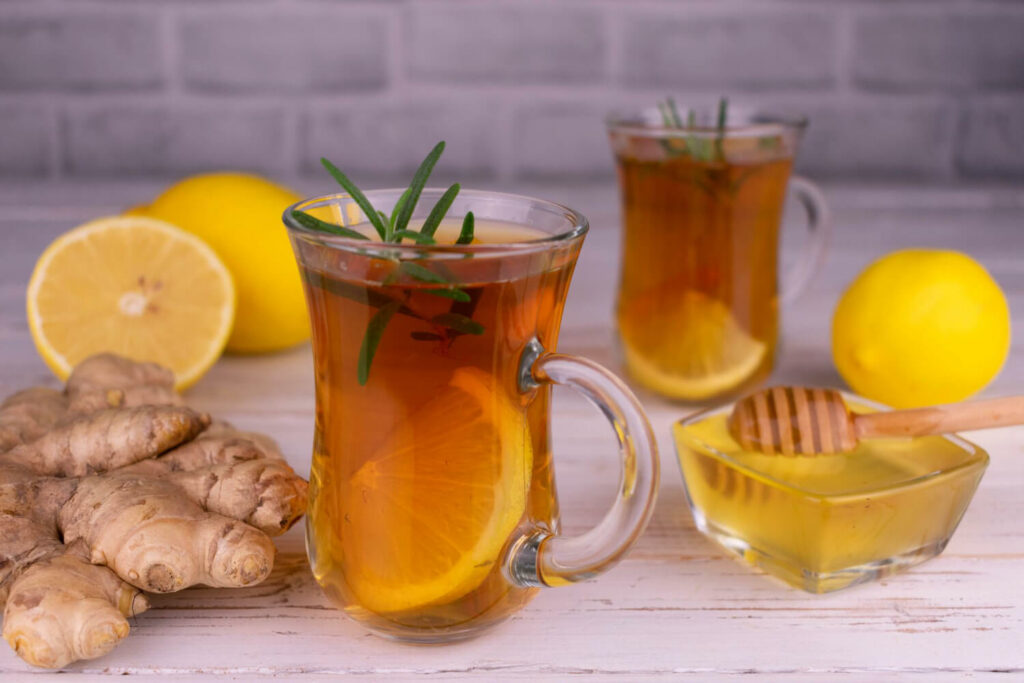Lemon ginger tea, a simple concoction of hot water steeped with ginger and lemon slices, is a popular beverage enjoyed worldwide.
But did you know that this delightful drink holds a treasure trove of surprising benefits that extend far beyond a pleasant cup of tea? From boosting brainpower to aiding digestion, there are many lemon ginger tea benefits that can enhance your well-being.
Lemon Ginger Tea Benefits
If you’re asking yourself what are the benefits of lemon ginger tea, then you’ve come to the right spot. Even though lemon ginger tea has many benefits, we mentioned the 7 most important ones that you should know if you’ve been feeling sick or down lately.
So the main benefits are:
- Sharper Mind, Better Memory: Lemon ginger tea, with its ginger content, might hold benefits for cognitive function and memory.
- Blood Sugar Management: This tea, with both lemon and ginger, might offer support for managing blood sugar levels.
- Taming the Flames: The anti-inflammatory properties of ginger and lemon in this tea could potentially help reduce pain and inflammation.
- Guarding Your Heart: Components in lemon ginger tea, particularly ginger, might contribute to a healthy heart by potentially lowering bad cholesterol and reducing inflammation.
- Digestive Delight: Lemon ginger tea, with its lemon content, can aid digestion and soothe occasional heartburn or indigestion, while ginger tackles nausea.
- Freshening Up: Beyond its deliciousness, lemon ginger tea, with the power of lemon and potentially ginger, can help freshen breath.
- Hydration Hero: This flavorful tea encourages fluid intake with its hot water base and the enticing taste of lemon and ginger, keeping you hydrated.
Now that you are familiar with lemon ginger tea benefits, let’s dig deeper into each one of them.

1. Sharper Mind, Better Memory
Our brains are constantly working, and keeping them sharp is crucial for optimal function. Research suggests that lemon ginger tea might be a surprising ally in this endeavor.
Ginger, the star ingredient, contains a powerful compound called gingerol. Studies have shown gingerol to possess neuroprotective qualities, potentially protecting brain cells from damage and even enhancing cognitive function.
How might this translate to a sharper you? Studies have indicated that ginger consumption may improve memory and processing speed in healthy adults.
Additionally, some research suggests ginger’s ability to increase blood flow could benefit cognitive function. Improved blood flow to the brain can potentially deliver more oxygen and nutrients, leading to enhanced alertness and focus.
While more research is needed to fully understand the mechanisms at play, incorporating lemon ginger tea into your routine might be a delicious way to support cognitive health.
2. Blood Sugar Management
Lemon ginger tea’s potential to manage blood sugar levels is another surprising benefit. While not a cure-all, this tea might offer valuable support for those with diabetes or prediabetes.
Lemons boast a good amount of vitamin C, which some studies suggest may improve insulin sensitivity, a key factor in blood sugar regulation.
Ginger, on the other hand, may help regulate blood sugar by mimicking the effects of insulin in the body and potentially slowing down the absorption of carbohydrates from food. While the research is ongoing, these findings suggest that lemon ginger tea could be a helpful addition to a diabetes management plan, alongside a healthy diet and exercise.
It’s important to consult with your doctor before making any significant changes to your diabetes management routine.
3. Relief from Pain and Inflammation
Chronic inflammation is linked to a variety of health issues, including heart disease, arthritis, and even cancer. The good news? Lemon ginger tea packs a powerful anti-inflammatory punch.
Ginger is a well-established natural remedy for inflammation, thanks to its content of gingerol. Studies have shown gingerol to be as effective as some over-the-counter pain relievers in reducing pain and inflammation associated with conditions like osteoarthritis.
Lemons, too, contribute anti-inflammatory properties. They contain compounds like limonene and hesperidin, which have been shown to reduce inflammatory markers in the body.
So, the next time you experience a headache, menstrual cramps, or general muscle aches, consider brewing a cup of lemon ginger tea. Its soothing properties might offer welcome relief.
4. Guarding Your Heart
Heart disease is still a leading cause of death globally. While lemon ginger tea isn’t a magic bullet, its components might contribute to a healthy heart.
Ginger may help lower bad (LDL) cholesterol levels while potentially increasing good (HDL) cholesterol. Additionally, ginger’s anti-inflammatory properties could benefit heart health by reducing inflammation in blood vessels, a factor associated with heart disease.
Lemons, rich in vitamin C, might also play a role. Vitamin C is an antioxidant that helps protect cells from damage, potentially reducing the risk of heart disease. While more research is needed to fully understand the specific effects of lemon ginger tea on heart health, its components suggest it could be a heart-healthy addition to your diet.
5. Soothing Upset Stomachs and Aiding Digestion
Lemon ginger tea is a friend to your digestive system. Lemons contain citric acid, which can help stimulate saliva production and aid digestion. Additionally, citric acid might help break down food and ease occasional heartburn or indigestion.
Ginger, on the other hand, is a well-known natural remedy for nausea and vomiting. Its effectiveness has been demonstrated in studies on nausea associated with pregnancy, motion sickness, and even chemotherapy. So, the next time you experience an upset stomach or nausea, brewing a cup of lemon ginger tea could provide much-needed relief.
6. Freshening Up
Lemon ginger tea isn’t just about internal benefits; it can also work wonders for your breath. Lemons, with their natural acidity, possess cleansing properties. They can help neutralize bacteria in the mouth, a major contributor to bad breath. This makes lemon ginger tea a refreshing and naturally effective way to freshen your breath.
The addition of ginger further enhances this benefit. Ginger possesses antibacterial properties as well, potentially adding another layer of defense against bad breath-causing bacteria.
So, skip the artificial fresheners and reach for a cup of lemon ginger tea instead. Not only will you be treating your taste buds, but you’ll also be leaving a lasting impression with a fresh, minty aroma.
7. Hydration Hero
Staying hydrated is necessary for optimal health, but plain water can sometimes feel bland. Lemon ginger tea offers a delicious and healthy way to increase your fluid intake. The hot water component provides essential hydration, while the lemon and ginger add a delightful flavor twist, encouraging you to drink more throughout the day.
Dehydration can lead to fatigue, headaches, and even constipation. By opting for lemon ginger tea, you’ll be nourishing your body with fluids while enjoying a warm and flavorful beverage. Additionally, lemons provide a small amount of vitamin C, which can further support your immune system, especially during cold and flu season.
Nutritional Value of Lemon Ginger Tea
Lemon and ginger, the key ingredients in lemon ginger tea, are individually known powerhouses of various nutrients.
Lemon boasts vitamin C, antioxidants, and fiber, while ginger is a source of vitamin B6, magnesium, and potassium. However, it’s important to understand the impact of steeping these ingredients in hot water for tea.
The dehydration process used to create dried lemon and ginger, and the boiling water used for steeping, can significantly reduce the final nutrient content in the tea. Therefore, an unsweetened cup of lemon ginger tea typically offers minimal calories, fat, sodium, carbohydrates, sugars, or protein.

Here’s a quick look at the nutrients per serving of unsweetened lemon ginger tea:
- Calories: 0
- Sugars: 0 grams
- Proteins: 0 grams
- Total Fat: 0 grams
- Sodium: 0 grams
- Total Carbohydrates: 0 grams
Important Note:
- Adding extras like honey, milk, cream, or artificial sweeteners will significantly alter the nutritional profile of your tea. Be mindful of these additions if you’re tracking your calorie or sugar intake.
While the base tea itself might be low in calories and nutrients, lemon ginger tea offers the benefit of encouraging hydration, and the potential lemon ginger tea benefits associated with them remain significant.
How to Make Lemon Ginger Tea?
You can make a cup of lemon ginger tea in a breeze. Here’s a basic recipe which can be customized to your taste:
- Heat Up the Water: Start by bringing a cup of water to a boil in a saucepan or kettle.
- Peel a small piece of ginger and thinly slice it (or mush it). These slices will release their flavorful and health-promoting properties during steeping.
- Steep it Right: Add the ginger slices to the boiling water. Cover the pot or kettle and let it simmer for 5-10 minutes. The steeping time will determine the intensity of the ginger flavor. For a milder taste, aim for 5 minutes. If you prefer a stronger ginger kick, extend the steeping time to 10 minutes.
- Lemon Zest (Optional): While steeping the ginger, you can zest half a lemon using a grater. Zesting adds a subtle citrus aroma and a touch of lemon flavor to the tea.
- Once the ginger has finished steeping, turn off the heat. Squeeze the lemon juice from the zested lemon (or a fresh half if you didn’t zest) into the hot water.
- Sweeten Up (Optional): If desired, add a touch of honey, maple syrup, or another natural sweetener to taste.
- Strain and Sip: Strain the tea into a mug using a fine-mesh sieve to remove the ginger slices.
- Enjoy! Sit back, relax, and drink your warm cup of lemon ginger tea.
Personalize Your Cup
This is just a basic recipe, feel free to experiment and personalize your lemon ginger tea experience! Here are some ideas:
- Fresh Herbs: Add a sprig of fresh mint or lemongrass for an extra layer of flavor and aroma.
- Spice it Up: Include a cinnamon stick or a few cloves for a touch of warmth and spice.
- Fruity Twist: Add a few slices of other fruits like orange, grapefruit, or berries for a delightful flavor variation.

If you liked this recipe, make sure to check out more of our food recipes.
A Final Note: A Simple Yet Powerful Ally for Well-Being
We hope we have answered your question on what are the benefits of drinking ginger and lemon tea here. As we can see, lemon ginger tea is a simple yet surprisingly powerful beverage that can enhance your well-being in various ways.
From potentially boosting brain function and managing blood sugar to reducing inflammation and aiding digestion, this warm cup packs a punch of health benefits. Its refreshing taste and ability to freshen breath make it an enjoyable addition to your daily routine.
Incorporating lemon ginger tea into your lifestyle is just one piece of the puzzle for optimal health. Maintaining a balanced diet, engaging in regular exercise, and getting enough sleep are all crucial for overall well-being. However, this delightful tea can be a delicious and effective way to support your health journey and add a touch of warmth and flavor to your day.




